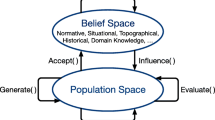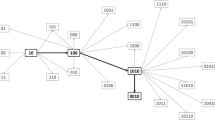Abstract
In this paper we investigate the role that the competition among knowledge sources plays in the problem solving behavior of a population as the complexity of the optimization problem solving landscapes increases. We employ a type of game theoretic mechanism, auctions, in our study. Our main goal is to determine whether it matters if knowledge sources competed for individuals using auction mechanisms or weighted majority win mechanisms as the landscape complexity increased. The weighted majority win situation allows the Knowledge Sources to make predictions about future success whereas the Auction mechanism allows them to invest in their future by using tokens earned from recent performance. This latter approach allows contextual Knowledge Sources such as Situational Knowledge to play a larger role. Although the results are preliminary, it appears that the auction mechanism is more efficient when solving a problem in situations where contextual information is available. In that case, it is easier for the knowledge sources to make judicial bids or investments. However, once the landscapes become chaotic there is less contextual information available and correspondingly little advantage to the auction mechanism over the weighted majority win situation in terms of the number of generations needed to achieve a solution.
















Similar content being viewed by others
References
Kennedy J, Eberhart RC (1995) Particle swarm optimization. In: Proceeding of the IEEE international conference on neural networks, Perth, Australia, IEEE Service Center, pp 12–13
Dorigo M, Maniezzo M, Colorni A (1996) Ant system: optimization by a colony of cooperating agents. IEEE Trans Syst Man Cybern 26(1):29–41
Reynolds RG (1978) On modeling the evolution of hunter-gatherer decision-making systems. Geogr Anal 10(1):31–46
Kohler T, Gummerman G, Reynolds RG (2005) Virtual archaeology. Sci Am 293(1):76–84
Dawkins R (1976) The selfish gene. Oxford University Press, Oxford
Reynolds RG, Ali MZ (2008) Computing with the social fabric: the evolution of social intelligence within a cultural framework. IEEE Comput Intell Mag 3(1):18–30
Che X, Ali MZ, Reynolds RG (2010) Robust evolution optimization at the edge of chaos: commercialization of cultural algorithms. In: 2010 IEEE Congress on Evolutionary Computation (CEC), 18–23 July 2010, pp 1–8
Reynolds RG, Ali MZ, Jayyousi T (2008) Mining the social fabric of archaic urban centers with cultural algorithms. Computer 41(1):64–72
Krishna V (2002) Auction theory. Academic Press, Burlington, New York
De Jong K, Morrison R (1999) A test problem generator for nonstationary environments. In: Proc 1999 Congr Evol Comput, pp 2047–2053
Reynolds RG et al (2005) Knowledge swarms: generating emergent social structure in dynamic environments. In: Proceedings of the AGENTS 2005 Conference on Generative Social Processes, Models, and Mechanisms, Chicago, Illinois, 13–15 Oct 2005
Langton C (1992) Life at the edge of chaos. Artif Life II 10:41–91
Author information
Authors and Affiliations
Corresponding author
Rights and permissions
About this article
Cite this article
Reynolds, R.G., Kinnaird-Heether, L. Optimization problem solving with auctions in Cultural Algorithms. Memetic Comp. 5, 83–94 (2013). https://doi.org/10.1007/s12293-013-0112-8
Received:
Accepted:
Published:
Issue Date:
DOI: https://doi.org/10.1007/s12293-013-0112-8




